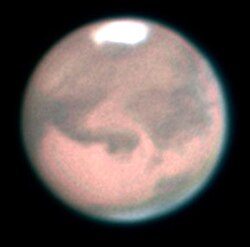
Back Característica d'albedo Catalan Albedo feature German Característica de albedo Spanish Formation d'albédo French Kenampakan albedo ID Caratteristica di albedo Italian アルベド地形 Japanese 반사율 지형 Korean Albedoformatioun LB Альбедо шинж чанар Mongolian

In planetary geology, an albedo feature is a large area on the surface of a planet (or other Solar System body) which shows a contrast in brightness or darkness (albedo) with adjacent areas.
Historically, albedo features were the first (and usually only) features to be seen and named on Mars and Mercury. Early classical maps (such as those of Schiaparelli[1] and Antoniadi[2]) showed only albedo features, and it was not until the arrival of space probes that other surface features such as craters could be seen.
On bodies other than Mars and Mercury, an albedo feature is sometimes called a regio.
On bodies with a very thick atmosphere like Venus or Titan, permanent albedo features cannot be seen using ordinary optical telescopes because the surface is not visible, and only clouds and other transient atmospheric phenomena are seen. The Cassini–Huygens probe observed multiple albedo features on Titan after its arrival in Saturn's orbit in 2004.
The first albedo feature ever seen on another planet was Syrtis Major Planum on Mars in the 17th century.[3][4]
Today, thanks to space probes, very high-resolution images of surface features on Mars and Mercury are available, and the classical nomenclature based on albedo features has fallen somewhat into disuse, although it is still used for Earth-based observing of Mars by amateur astronomers.
However, for some Solar System bodies (such as Pluto prior to the New Horizons mission), the best available images show only albedo features. These images were usually taken by the Hubble Space Telescope or by ground-based telescopes using adaptive optics.
Cydonia Mensae on Mars is an example of an albedo feature.
- ^ Ley, Willy and von Braun, Wernher The Exploration of Mars New York:1956 The Viking Press Pages 70–71 Schiaparelli's original map of Mars
- ^ Antoniadi's map of Mercury
- ^ Morton, Oliver (2002). Mapping Mars: Science, Imagination, and the Birth of a World. New York: Picador USA. pp. 14–15. ISBN 0-312-24551-3.
- ^ William Sheehan. "The Planet Mars: A History of Observation and Discovery - Chapter 2: Pioneers". Archived from the original on 2012-04-26. Retrieved 2015-01-05.